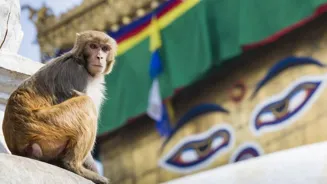What’s the one thing you will almost always encounter during a temple visit in India? Monkeys, the mischievous mafia that lurks in corners, waiting to
snatch your valuables- phones, sling bags, expensive sunglasses. And what follows isn’t a chase, it can easily be called an extortion racket. On a recent visit to the Shri Radhavallabh Lal Ji Temple in Vrindavan, just as I folded my hands in prayer, I felt a strong tug, as if a child was yanking at my sling bag. Before I could react, the panditji quickly stepped in and shooed away the monkey. Though he couldn’t break my bag's sling, he did leave his mark on my hand-embroidered bag. The monkey didn’t waste time though and he lunged at another devotee, a young girl and this time successfully ran off with her bag. She panicked - “It has my iPhone and all my money!” she cried. The temple handlers calmly directed her to get packets of Frooti. She ran and returned with the drink and in a perfect mafia deal, the monkey handed back the bag and ran away with Frooti. The panditji laughed and warned me, “Hide everything in your dupatta, anything that they can see is at risk. These monkeys are smart. They know exactly what to target. They will only snatch important things that force people to bribe them with food to get their belongings back.” A smart extortion technique. I remembered my visit to Bhairavnath temple years ago which had fewer devotees and many more monkeys. The situation had become so bad that the temple priests even brought in a langur to keep the peace. But the monkeys remained a menace. They would snatch anything from prasad, sunglasses, hats, even slippers. And it does not happen only in India. At Bali’s cliffside Uluwatu Temple, monkeys have been snatching tourists’ phones and wallets, holding them ransom for food. The 600 sacred macaques are notorious for this barter game, which is a decades-old ritual at the spiritual site. WSJ spoke to some primate researchers who said that the monkeys use these belongings to trade food with humans. They wrote in their 2021 academic paper that these monkeys have "unprecedented economic decision-making processes". But it was during a visit to Yala National Park in Sri Lanka that I learned something surprising about monkey behaviour. After finishing a guided foot safari, we were welcomed with a lavish breakfast spread right in the middle of the jungle. There were monkeys around, but instead of pouncing on the food, they simply played among the trees or sat calmly on trees. It obviously made me curious and I asked one of the forest rangers, “If this were India, they would have raided the food by now, regardless of how many people were around.” He laughed and explained that monkeys function in a strict hierarchy. Lower-ranking monkeys always fetch food for the higher-ups. When humans feed monkeys, we unknowingly place ourselves below them in this chain. The monkey then believes it can demand or forcefully take what it wants. But if that line isn’t crossed and humans don’t offer food, the monkeys don’t challenge them. In India though that boundary is blurred. Monkeys are not just animals, they are symbols. Lord Hanuman is often seen as embodied in them. Feeding monkeys, especially on Tuesdays and Saturdays, is seen as an act of devotion. So when a monkey raided our neighbour’s fridge one Tuesday, they were thrilled. “Hanumanji aaye hain,” the uncle smiled as he stood outside for 40 minutes, waiting for the monkey to finish his meal and leave. As a child, I found it hilarious but this is reality in many parts of India. We happily feed them in faith but when they strike back taking not just food but valuables, we are left helpless. And that’s the strange space we now inhabit - somewhere between faith, chaos and a very clever monkey-run extortion mafia.













